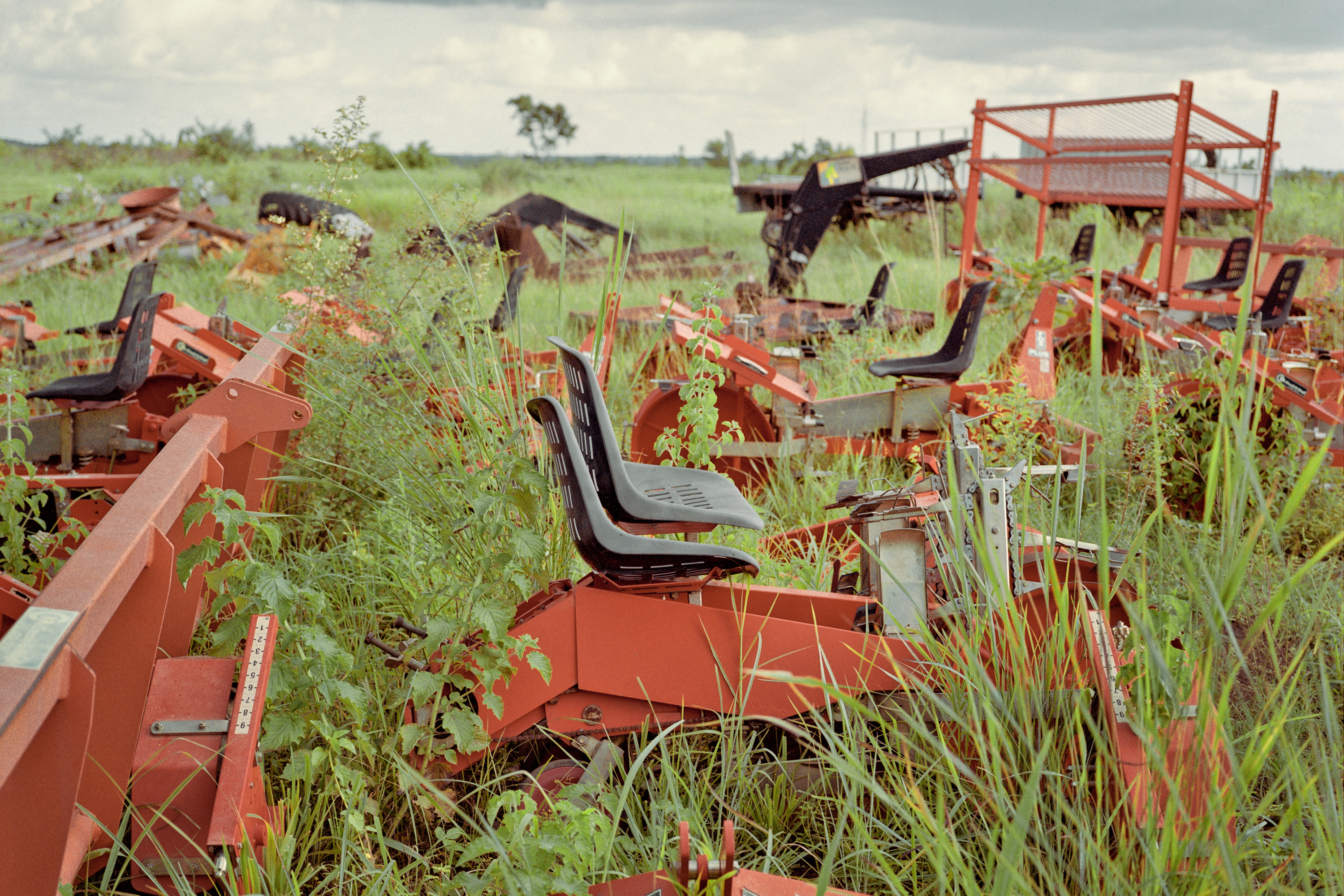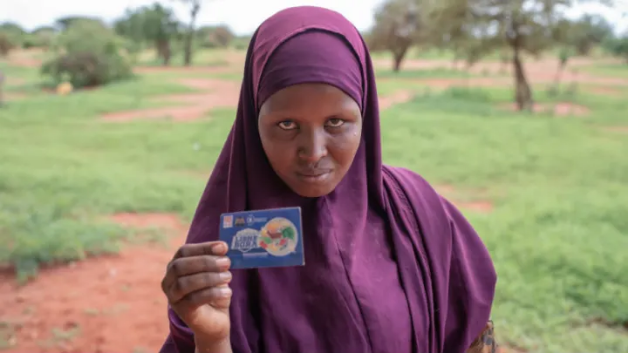
View the original version of this story at Devex
WAJIR, Kenya—One afternoon in May, Ahmed Mohamed Saney, 56, sits on a mat outside his dome-shaped reed hut with his children, wife, and mother—concerned about how he will feed his large family.
Saney, a father of 14, has not been feeling well for some time and has not worked in days. He collects firewood in the bushes surrounding Wajir town, in northeast Kenya, and delivers it to hotel owners. The money he has left after hiring a donkey cart is barely enough to feed his family. His eldest son has been sent home from school for nonpayment of school fees. His nine-year-old son, who has a bladder exstrophy, has not been able to get the surgery he requires.
The main economic activity in Wajir is rearing livestock. In the past few years, many have lost their animals to long droughts, leaving families without a steady source of income. Without adequate food, malnutrition has taken root among the vulnerable.
Young children and breastfeeding mothers such as Farhiya Shimay Garore have borne the brunt. Garore, 24, is a mother of three from Boji-Yeri in Wajir South. She and her husband lost their cattle, and their remaining herds of goats have not yet had kids, which means no milk for her children.
Both Saney and Garore were receiving assistance under two different cash transfer programs. Saney registered with the U.K. Department for International Development-funded, Kenyan government-run Hunger Safety Net Programme in 2013, while Garore registered with the World Food Programme in January 2018 under a project to curb malnutrition.
The projects were life-saving for the two families—until the transfers stopped at a time when the projects were still active, prompting Saney and Garore to wonder what had happened to this vital safety net.
Though cash transfer programs have been touted as efficient and dignifying alternatives to project-based aid, some residents of Wajir who registered with the programs reported not receiving cash when expected. While there may have been an explanation for why payments stopped, Saney and Garore told Devex they didn't know what it was—and the lack of information about when they would and would not receive payments was echoed by many other residents of Wajir.
In 2016, $2.8 billion in humanitarian assistance was disbursed globally through cash and vouchers, a 40 percent increase from 2015 and twice what was disbursed in 2014, according to a report from the Cash Learning Partnership. While donors continue to expand these programs and register more people for cash transfers, they also confront challenges around clearly explaining how and why some beneficiaries are targeted for disbursements, while others are not.
Missing payments
The Hunger Safety Net Programme targeted poor households, such as Saney’s, which was registered along with roughly 94,000 other households in Wajir and other counties during the first phase in 2013.
According to HSNP, there are 19,201 households in Wajir County under the category of Group 1—the “regular” group—which includes the most vulnerable households. These households receive $54 every other month. Group 2, the emergency group, is paid $27 monthly in the event of an emergency in the country, such as drought or flooding, for the duration of the emergency. There are over 74,000 households under this category in Wajir County, according to HSNP’s records.
Saney, who belongs to Group 2, said that since he was registered in 2013, he received a total of $73 in three different installments, but hasn’t received any money for the past two years. Wajir County, meanwhile, has suffered numerous serious drought cycles, which triggered cash transfers to Group 2 beneficiaries.
Asked whether he has followed up about his case, Saney said the local administrator looks out for his own clan members: “I know the chief personally, but I can’t go to him with complaints because I know he will not help me.”
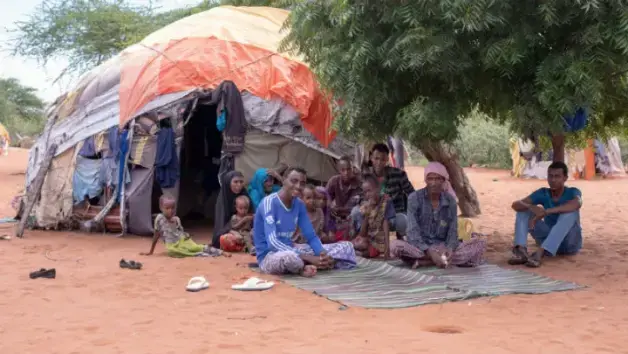
Nurto Mohamed, 40, who lives in Bula Catholic with her five children and 70-year old mother Halima Dakane, was also registered in 2013. She continued receiving $27 every month during droughts, but her mother did not. Her mother does not have a national identity card, and this made it difficult for her to be registered. When HSNP officials visited Mohamed’s home two years ago, they told her she could use her identification card to register her mother too.
“Since then, I have never received money from them. Not mine, not my mother’s,” Mohamed said. Her small grocery business collapsed due to Wajir’s bad roads, which prevented her from receiving fresh supplies. Her husband left to live with his second wife far from Wajir.
Two local administrators, chief Ahmed Mohamed of Qudama and chief Hussein Ibrahim of Danaba, agreed that a large number of registered residents in Group 2 do not receive cash transfers as expected. Chief Mohamed said that he had received complaints from many of his constituents.
“The emergency group is not getting anything,” he said.
All he can do is report this to the National Drought and Management Authority office in Wajir town when he visits.
“They have never told me that my account is not working, just that there is no money,”
—Ahmed Mohamed Saney, resident of Wajir town
Disparity among recipients
WFP’s cash transfer program in Wajir county was a short-term effort targeting malnourished pregnant mothers and those with young babies. Garore was one of them. Her youngest child was barely 6 months old, and she felt lucky to be recruited to the cash transfer program in January 2018.
Through the program, she was supposed to receive money on a monthly basis. She told Devex she should have received 2,000 Kenyan shillings ($20) monthly from February for the duration of the drought, but she said this did not happen. Garore said she received two installments before the transfers stopped.
“I was registered in January and I received only 4,000 shillings. I used the money to buy food for the children,” she said.
Other women in Boji-Yeri who had been registered together with Garore continued receiving the $20 monthly installments until April. Garore, who had a card as evidence for her registration, called a toll-free line to complain, but it either went unanswered or failed to connect. Garore and her husband resorted to feeding goat milk to their baby.
“My husband has 100 goats but none of them has milk right now, so we buy goat milk when we can, and that is what we feed the baby,” she said.
WFP acknowledged receiving several complaints from individuals who did not receive the disbursements. Martin Karimi, communication officer at WFP, attributed the nondisbursement to mistakes during registration.
“The beneficiaries who did not give correct details at registration, like phone numbers that were not registered to them, did not receive their cash entitlement. Most of the complaints that we received were of this nature. The complainants were advised to register their phone lines and provide this information to WFP, which in turn verified the details again on the M-Pesa system [a mobile money transfer service] and if found correct, the cash was disbursed to the new numbers,” he said.
HSNP disagreed with the complaints saying that no one had been left behind in the disbursements. Carrie Ndoka, communication specialist with HSNP, said that “whenever there is an emergency scale up, not all Group 2 receive the money, and we suspect this is where the complaints are emanating from and are linked to Group 2's expectations.”
She said that for Group 2 to receive emergency scale up funds, it depends on the drought status of the subcounty in which the Group 2 households live; availability of funds by the program; the poverty status of Group 2 households as ranked on HSNP's database; and whether or not Group 2 households have an active bank account.
Devex did most of its reporting in Wajir South and in villages around Wajir town. Saney and Maimuna Mohamed, for instance, both live in the same subcounty, in neighboring villages on the outskirts of Wajir. They are both Group 2 beneficiaries, yet Mainuma Mohamed has never missed a payment and Saney has not received payment for years. This is despite having opened an account with Equity Bank, which disburses payment through its agents. Saney has gone to town multiple times to check his account and every time he is told that the account has no money.
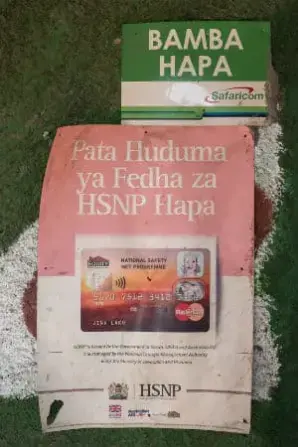
“They have never told me that my account is not working, just that there is no money,” he said.
It is evident that the people targeted by the program, and especially those who are supposed to receive money only during emergencies, do not understand why a neighbor will receive regular money while they do not. Ndoka said HSNP has done campaigns in the area to inform people.
“This information has been communicated to them ... through multiple channels, including recent local radio campaigns in the four counties,” she said.
In March, HSNP sent a text message alerting Equity Bank agents that payment had been disbursed for Group 2 beneficiaries. The text message was sent to an Equity Bank agent in Wajir town, within walking distance of Saney’s home, but he did not receive any money.
While Saney finds this disconnect frustrating, it may have a straightforward explanation: Those who registered for cash transfers in the drought-prone area are eligible to receive them, but because of limited resources, disbursements are prioritized according to poverty level. The program currently disburses money to roughly 100,000 of the 372,000 people that were registered, according to HSNP officials who spoke to Devex.
“These organizations use a wrong entry point. When there is a project like Hunger Safety Net they whisper to the chief, who then whispers to gate-keepers in the community, who then brings a list of family and friends—not the deserving cases.”
—Mohamed Omar, executive director, Wajir Paralegal Network
Confusing protocols
Chiefs are supposed to play a key role in registering beneficiaries. One of the chiefs spoke to Devex about the process, alleging that registration does not always follow the official protocol.
Chief Ibrahim of Danaba told Devex that HSNP reached out to him to summon residents of his location for the registration exercise. When the group was seated, he said an officer threw a pen into the sitting crowd and called on the person who had been hit by the pen.
“He told the person to choose 10 people to be registered in the program, and the 10 were told to choose 10 deserving cases each,” Ibrahim said.
Another chief, Ahmed Mohamed of Qudama said that the main problem with the program is that during registration, not all people received the information and not all areas are reached. Most people in Wajir are nomadic pastoralists moving from place to place in search of pasture and water for their livestock. When the registration exercises happen, the exercises are restricted to the centers and villages.
“The last time they came, most people were deep in the bush with their livestock so they registered the few who were found in the centers,” Ahmed Mohamed said.
Mohamed Omar, executive director for Wajir Paralegal Network, said the practice of using chiefs during registration at all leaves it prone to corruption.
“The problem with Hunger Safety Net Programme is nepotism and corruption,” Omar said. “These organizations use a wrong entry point. When there is a project like Hunger Safety Net they whisper to the chief, who then whispers to gate-keepers in the community, who then brings a list of family and friends—not the deserving cases,” he said. “Poverty is not directly proportional to clan membership.”
Ndoka of HSNP refuted the claims of nonrepresentative registration, saying that it only happened during the pilot stage. She explained that HSNP uses a targeting method known as proxy means testing, by which they rank the key indicators collected from households during registration, combined with a community-based wealth ranking, in which the community is involved in identifying its poorest residents.
According to Ndoka, apart from hitches during registration, the program has only had a few instances of delays when money did not reach the recipients in time. In these cases, HSNP sends out messages to banking agents alerting them of the delay.
Once HSNP does the disbursement, it also sends messages to area chiefs, who then inform residents in their locations that the money has been released and they can then go to town to make a withdrawal. Ndoka attributes delays to the national treasury’s failure to disburse funds in time.
Unexpected fees
Recipients are not supposed to be charged a transaction fee for their withdrawals, but some told Devex they have had fees of $1 per transaction imposed without explanation.
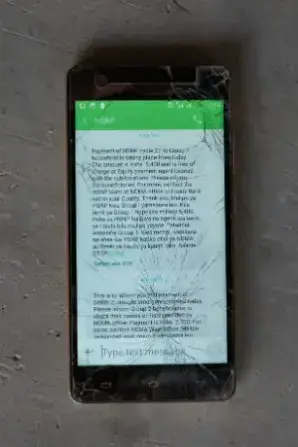
Sara Billow, a resident of Bula Catholic, said that when she withdraws her monthly HSNP cash transfer, she receives $53 instead of $54. She said that she has never asked about the deduction because she thought it was a standard withdrawal charge.
“We are told we are supposed to be given 5,400 [shillings], but when they deduct 100 shillings and you know it is money that nobody owes you — [that] you are being helped — then you just take what you have been given,” she said. “Though it is very wrong for someone to deduct what is not theirs without consent.”
A banking agent that Devex asked about the deductions denied any withdrawal charges. Ndoka said that HSNP is aware that some agents have been illegally deducting 100 shillings per withdrawal. The organization appealed to people targeted to report any illegal deductions.
HSNP is moving forward with its third phase. In this iteration, upon registering, recipients are given a credit card. Ndoka agreed that this may raise expectations, particularly among members of Group 2, who may not see any money for a long time since their disbursements depend of a disaster. The main reason for doing mass registration is to create the infrastructure for other programs and organizations to utilize, she said.
“25 organizations, including Save the Children, UNICEF, and Oxfam have used our infrastructure so far,” she said.
Continue reading the series, Part 4: When public restrooms fail, rent them out as churches? and learn more about What Went Wrong? here.
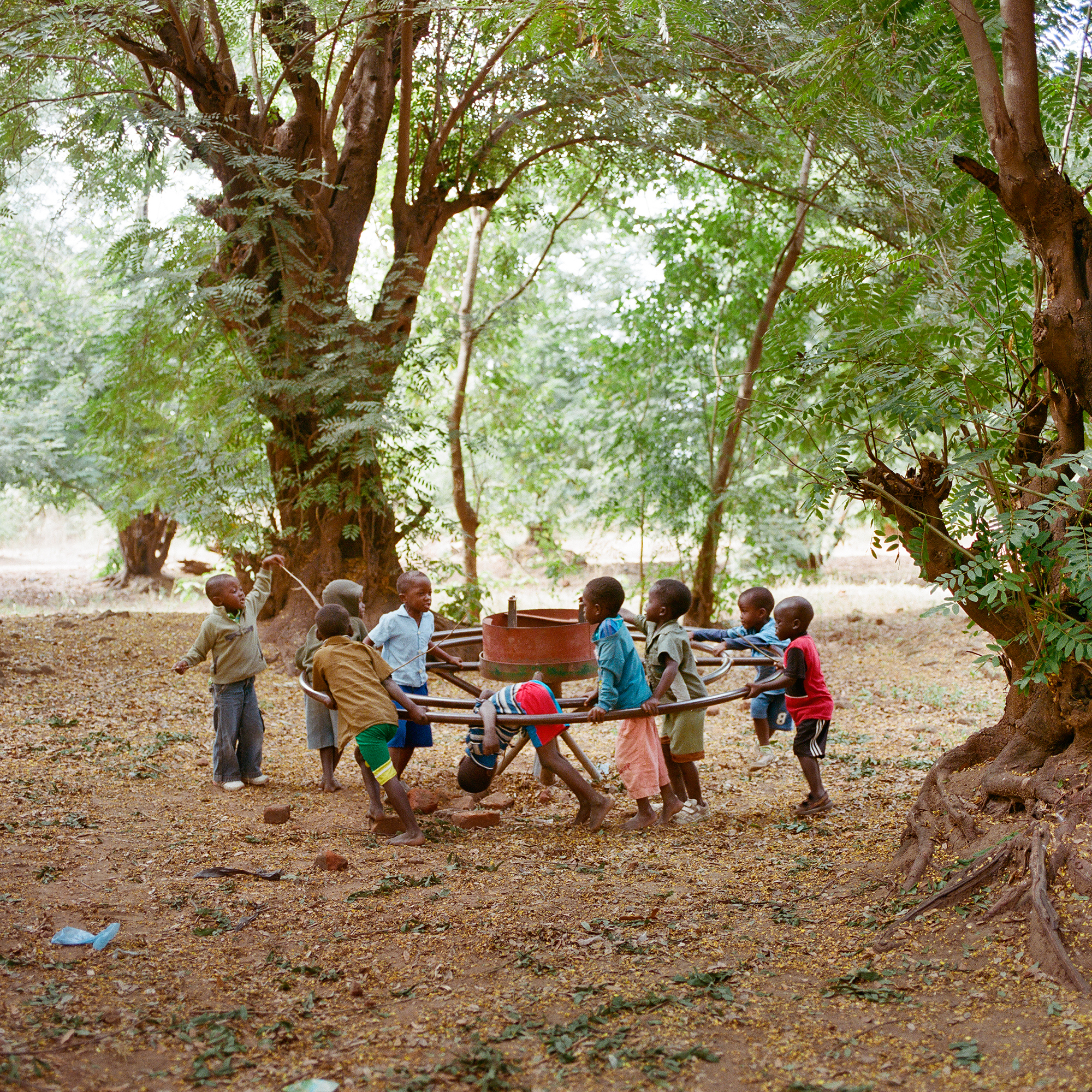
Education Resource
Meet the Journalist: Peter DiCampo
"What Went Wrong?" is a citizen journalism project that focuses a critical lens on failed foreign...



